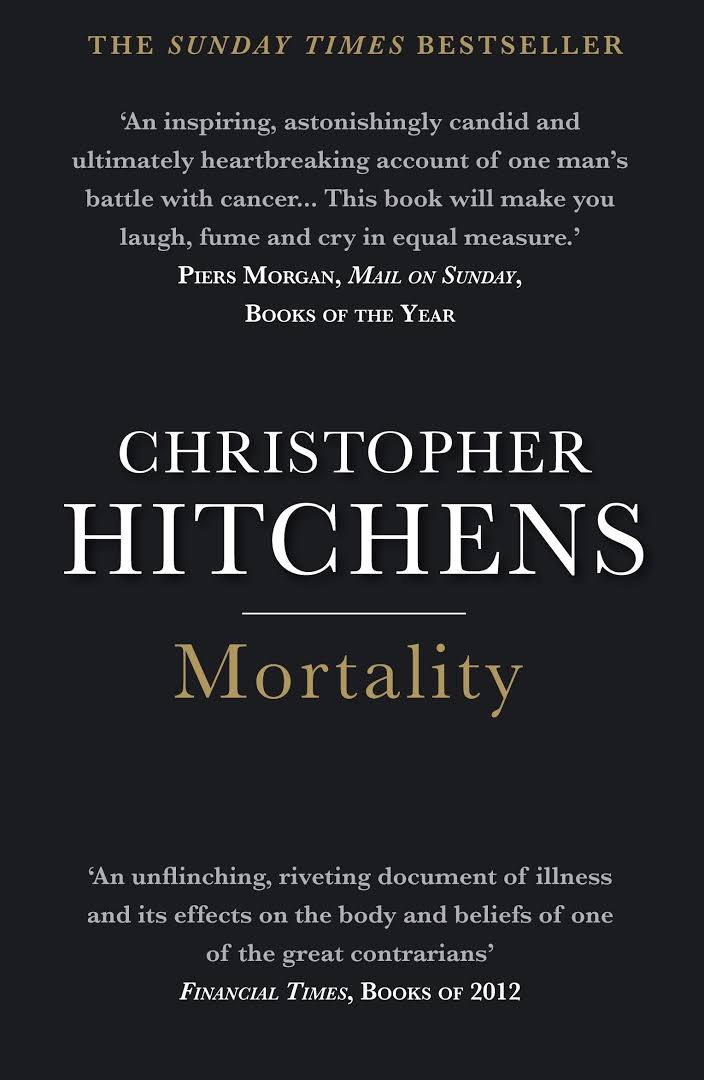Mortality: Christopher Hitchens
 This is a brief book. An unfinished one too. A book of manifold pain and dolour. This is his only book I’ve read. Fortunately it is somewhat autobiographical and by the help of the internet I’ve learnt quite a deal about him. He was a great debater, a writer, critic and columnist, to whom writing and talking was everything. Esophageal cancer almost took away his voice, put him in a condition where he was too feeble to write. From his own writing:
This is a brief book. An unfinished one too. A book of manifold pain and dolour. This is his only book I’ve read. Fortunately it is somewhat autobiographical and by the help of the internet I’ve learnt quite a deal about him. He was a great debater, a writer, critic and columnist, to whom writing and talking was everything. Esophageal cancer almost took away his voice, put him in a condition where he was too feeble to write. From his own writing:
I am typing this having just had an injection to try to reduce the pain in my arms, hands, and fingers. The chief side effect of this pain is numbness in the extremities, filling me with the not irrational fear that I shall lose the ability to write. Without that ability, I feel sure in advance, my “will to live” would be hugely attenuated. I often grandly say that writing is not just my living and my livelihood but my very life, and it’s true.
And yet, he is not the least uncomfortable with bitter truth of life, or I may even imply that he was too critical a thinker to consider the truth bitter. A lifelong stoic, critique of controlling and throttling philosophies (totalitarianism, religion and fascism) and scientific mind like Hitchens perhaps can take death seriously yet without panic. He was neither moved by internet bullies who thought that the whole cancer business is a strike blown by the God for his blasphemy nor by the prayers of more compassionate and learned debate opponents. He took his illness with reasonable calmness.
What is so great about this book? Is it his stoic calmness? Or his very urge to live and the willingness to struggle with the pain and try new methods? Or his soberness, wit and encouragements to others when he should’ve been delirious? Or his unbending intellectual self who denies to bow down before any supernatural in any situation? Or his agony of not being able to talk as before yet continuing to write with great fluency? He was a man of profound mental strength. It is a privilege to know him, even if it is only by his book.
Do not expect a deep philosophical treaty about death and the process of dying here. It is a rather real description of dying, where some people try to offer solutions stupidly about things they don’t know of, and others make you more miserable while trying to console you. Doctors will let you know that certain treatments simply won’t suit you.
This is a tale of the blunt truthfulness of dying.
From my adolescence to this day, I often felt a strong urge to end my life. Normally I don’t try to commit suicide, but I know in those times I would’ve been pretty much okay if I’ve died. It is a calm indifference about life and death that haunts me time to time. Dying in a sober and functional sense is what I want. Perhaps that is why books about death and dying intrigue me. I’ve even found uncanny similarities in our thoughts and attitude towards the death. Both of us attempts to savour our lives while taking death with as much calmness as we can muster.
He already had an autobiography, namely hitch-22. This is an unfortunate addition to his autobiographical writings. That inept event produced a profoundly insightful book about a subject on which not many people can write with wisdom and appeal.
Perhaps, as Richard Dawkins said, “Illness made Hitchens a symbol of the honesty and dignity of atheism”.1